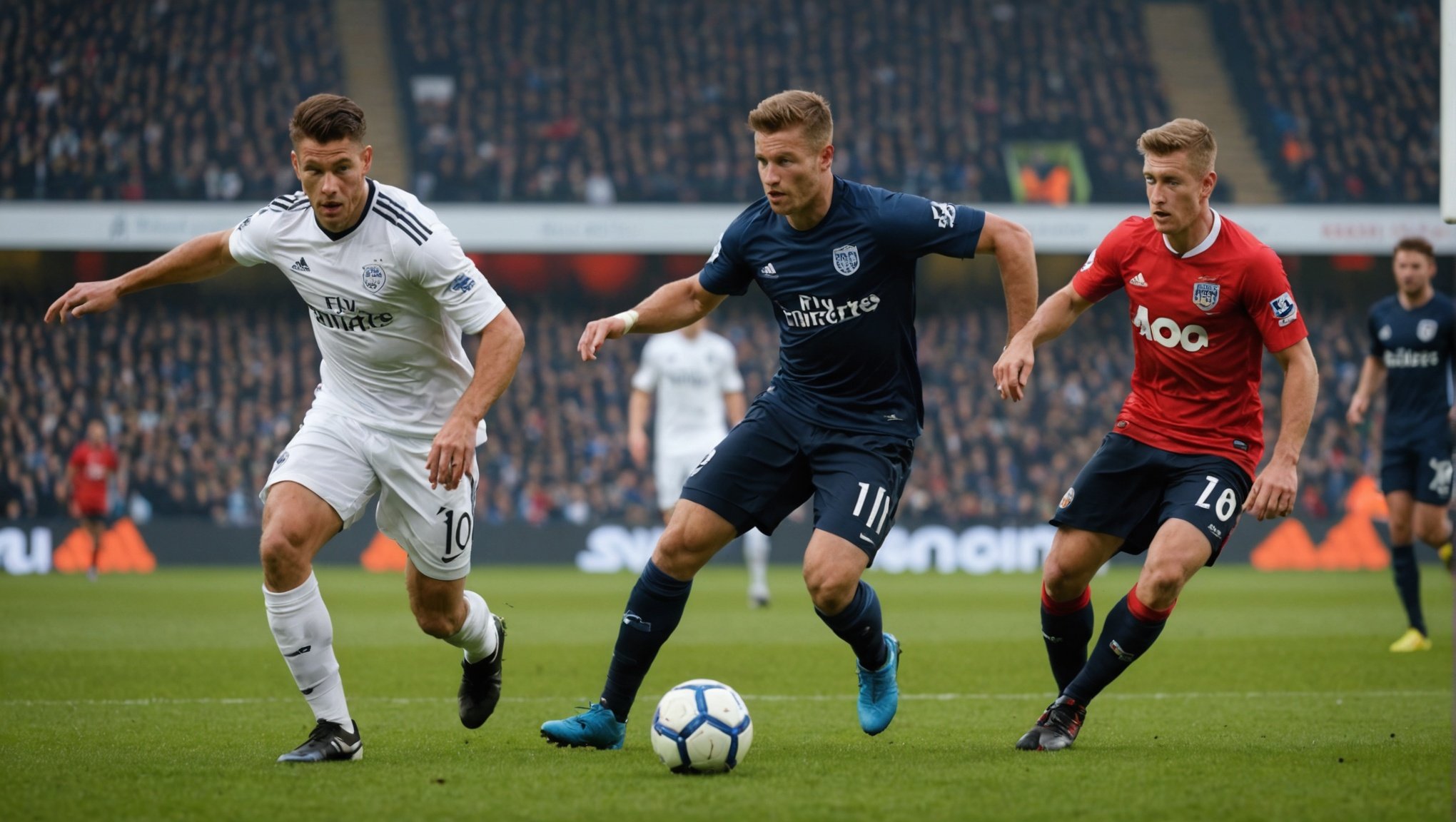Football clubs continuously seek an edge in player performance. By integrating sports science, clubs can unlock the hidden potential of their athletes. Advanced data analytics, tailored training regimens, and innovative recovery techniques not only enhance physical capabilities but also promote mental resilience. This cohesive approach challenges traditional methods, fostering an environment where players thrive. Discover how these innovative strategies are revolutionizing the landscape of football, driving teams toward unprecedented success.
Advanced Strategies for Player Performance Enhancement
In the realm of football, sports science integration has become a pivotal component in enhancing player performance. This approach involves a meticulous blend of technology and scientific methods to optimize athletes' capabilities on the field.
Also to discover : Overcoming Language Barriers: Strategies for Football Coaches Leading Multicultural Teams
Overview of Sports Science in Football
Sports science in football encompasses a broad spectrum of disciplines, including physiology, biomechanics, and psychology. By leveraging these areas, teams can gain insights into players' physical and mental states, enabling tailored training programs that address individual needs.
Key Areas of Focus for Player Performance Improvement
To boost player performance, sports science focuses on several critical areas:
Also read : Top Post-Game Recovery Strategies for Football Players Aged 30 and Above
- Injury Prevention: By analyzing movement patterns and workload, teams can reduce injury risks.
- Recovery Optimization: Tailored recovery protocols ensure players return to peak condition swiftly.
- Skill Development: Precision training enhances technical abilities through targeted exercises.
Importance of Data-Driven Decisions in Player Development
Data-driven decisions are crucial in player development, providing coaches with empirical evidence to refine strategies. By analyzing performance metrics, teams can identify strengths and weaknesses, allowing for innovative strategies that foster continuous improvement. This scientific approach not only enhances individual performance but also contributes to overall team success.
Successful Case Studies in Sports Science Integration
In the competitive world of football, several top clubs have successfully harnessed the power of sports science to elevate player performance and health. These case studies provide valuable insights into the practical application of sports science within the sport.
Analysis of Top Football Clubs Utilizing Sports Science
A prominent example is FC Barcelona, renowned for its comprehensive application of sports science. The club employs a dedicated team of scientists who focus on performance metrics, enabling precise monitoring of players' physical and mental states. This data-driven approach helps tailor training programs to individual needs, optimizing overall team performance.
Impact on Player Health and Injury Prevention
Clubs like Liverpool FC have demonstrated the significant impact of sports science on injury prevention. By analyzing data on movement patterns and workload, Liverpool has reduced player injuries, ensuring athletes maintain peak physical condition throughout the season. This proactive strategy not only enhances player longevity but also contributes to consistent team success.
Performance Metrics from Successful Integrations
Manchester City exemplifies how integrating sports science can lead to measurable improvements in performance metrics. The club uses advanced technology to collect and analyze data, informing strategies that enhance both individual and team capabilities. These examples in football illustrate how sports science can drive success, providing a model for other clubs aiming to achieve similar results.
Expert Insights and Interviews
In the ever-evolving field of football, expert interviews with sports science professionals provide invaluable insights into the integration and future of sports science. These professionals, ranging from sports scientists to coaches, offer unique perspectives on how data and technology are reshaping the game.
Interviews with Sports Scientists and Coaches
Engaging with sports scientists and coaches reveals a wealth of knowledge about the practical application of sports science. These expert interviews highlight the importance of a multidisciplinary approach, combining physiology, biomechanics, and psychology to enhance player performance. Coaches emphasize the role of technology in monitoring and improving athletes' physical and mental states.
Perspectives on the Future of Sports Science in Football
Sports science professionals share optimistic views on the future of football. They foresee advancements in wearable technology and data analytics, which will further personalize training programs and injury prevention strategies. The integration of artificial intelligence is anticipated to refine performance metrics, offering coaches precise tools to optimize team dynamics.
Key Takeaways from Expert Experiences and Recommendations
Experts recommend continuous education and adaptation to new technologies as crucial for staying ahead in sports science. They stress the significance of collaboration between scientists and coaching staff to ensure data-driven decisions translate into tangible performance improvements. By embracing these expert insights, football clubs can harness the full potential of sports science to achieve sustained success.
Emerging Technologies in Sports Science
In recent years, emerging technologies have significantly transformed the landscape of sports science, particularly in football. These sports science innovations are crucial in monitoring and analyzing player performance, offering unprecedented insights into athletes' capabilities.
Overview of New Technologies in Player Monitoring and Analysis
Advanced technology in football has introduced sophisticated methods for player monitoring. Wearable devices now track a range of metrics, from heart rate to movement patterns, providing real-time data that is invaluable for tailoring training programs. Additionally, video analysis software allows coaches to dissect game footage, identifying areas for improvement with precision.
The Role of AI and Machine Learning in Sports Science
Artificial Intelligence (AI) and machine learning are at the forefront of sports science innovations. These technologies enable the processing of vast amounts of data, uncovering patterns and trends that might otherwise go unnoticed. AI-driven platforms can predict injury risks by analyzing historical data, allowing for proactive measures to be taken. Machine learning algorithms also assist in personalizing training regimens, ensuring each player receives the most effective preparation.
Future Trends in Technology That Could Reshape Football Performance
Looking ahead, several emerging technologies promise to further revolutionize football. The integration of augmented reality (AR) in training sessions could provide players with immersive experiences, enhancing their tactical understanding and decision-making skills. Furthermore, advancements in biometric sensors are expected to offer deeper insights into physiological responses during matches, enabling real-time adjustments to strategies. As these technologies continue to evolve, they hold the potential to redefine the standards of player performance and team success in football.
Practical Tips for Club Management
Integrating sports science into a football club's operations requires strategic planning and execution. Club management must consider several factors to ensure the successful implementation of sports science programs.
Strategies for Implementing Sports Science Programs
To effectively integrate sports science, clubs should start by assessing their current capabilities and identifying areas for improvement. Establishing clear objectives is crucial for guiding the development of sports science initiatives. Clubs should focus on creating a structured plan that outlines the necessary steps for implementation, including the acquisition of technology and the development of training protocols. Engaging with experienced sports scientists can provide valuable insights and help tailor programs to meet specific needs.
Building a Multidisciplinary Team for Optimal Results
A successful sports science program relies on a multidisciplinary team that combines expertise from various fields such as physiology, biomechanics, and psychology. Club management should prioritize hiring professionals with diverse backgrounds to ensure a comprehensive approach to player performance enhancement. Collaboration between coaches, sports scientists, and medical staff is essential for developing integrated strategies that address both physical and mental aspects of player development.
Budget Considerations and Resource Allocation
Effective resource allocation is a critical aspect of integrating sports science. Clubs must evaluate their budget to determine the feasibility of investing in new technologies and personnel. Prioritizing expenditures that offer the greatest return on investment, such as wearable devices and data analytics software, can optimize performance outcomes. Additionally, clubs should explore partnerships with universities or research institutions to access cutting-edge innovations without incurring excessive costs. By carefully managing resources, club management can ensure the sustainability and success of sports science initiatives.
Benefits of Sports Science for Player Development
Incorporating sports science into football is a game-changer for player development. The integration of scientific methods and technology offers numerous benefits that significantly enhance performance and contribute to long-term success.
Long-term Benefits of Integrating Sports Science
The long-term benefits of sports science are profound. By utilizing data-driven insights, players can engage in personalized training regimens that focus on their unique strengths and weaknesses. This approach not only optimizes individual performance enhancement but also reduces the risk of injury, ensuring athletes maintain peak condition over time. Furthermore, continuous monitoring allows for adjustments that keep players at the forefront of their capabilities, fostering sustained growth and improvement.
Case Examples of Player Growth Influenced by Sports Science
Several clubs have witnessed remarkable player development through sports science. For instance, a young midfielder at a top European club saw a significant increase in his stamina and agility after implementing a tailored training program informed by biomechanical analysis. This transformation not only boosted his personal statistics but also had a ripple effect, elevating the team's overall performance. Such examples underscore the potential of sports science to unlock hidden talents and propel athletes to new heights.
Contribution to Overall Team Performance and Success
Sports science doesn't just benefit individual players; it enhances the entire team's performance and success. By analyzing collective data, coaches can devise strategies that maximize the squad's strengths while addressing areas for improvement. This holistic approach ensures that every player contributes effectively to the team's objectives, creating a cohesive unit capable of achieving remarkable results. As clubs continue to embrace these innovations, the synergy between scientific insights and football expertise promises to redefine the standards of excellence on the field.













